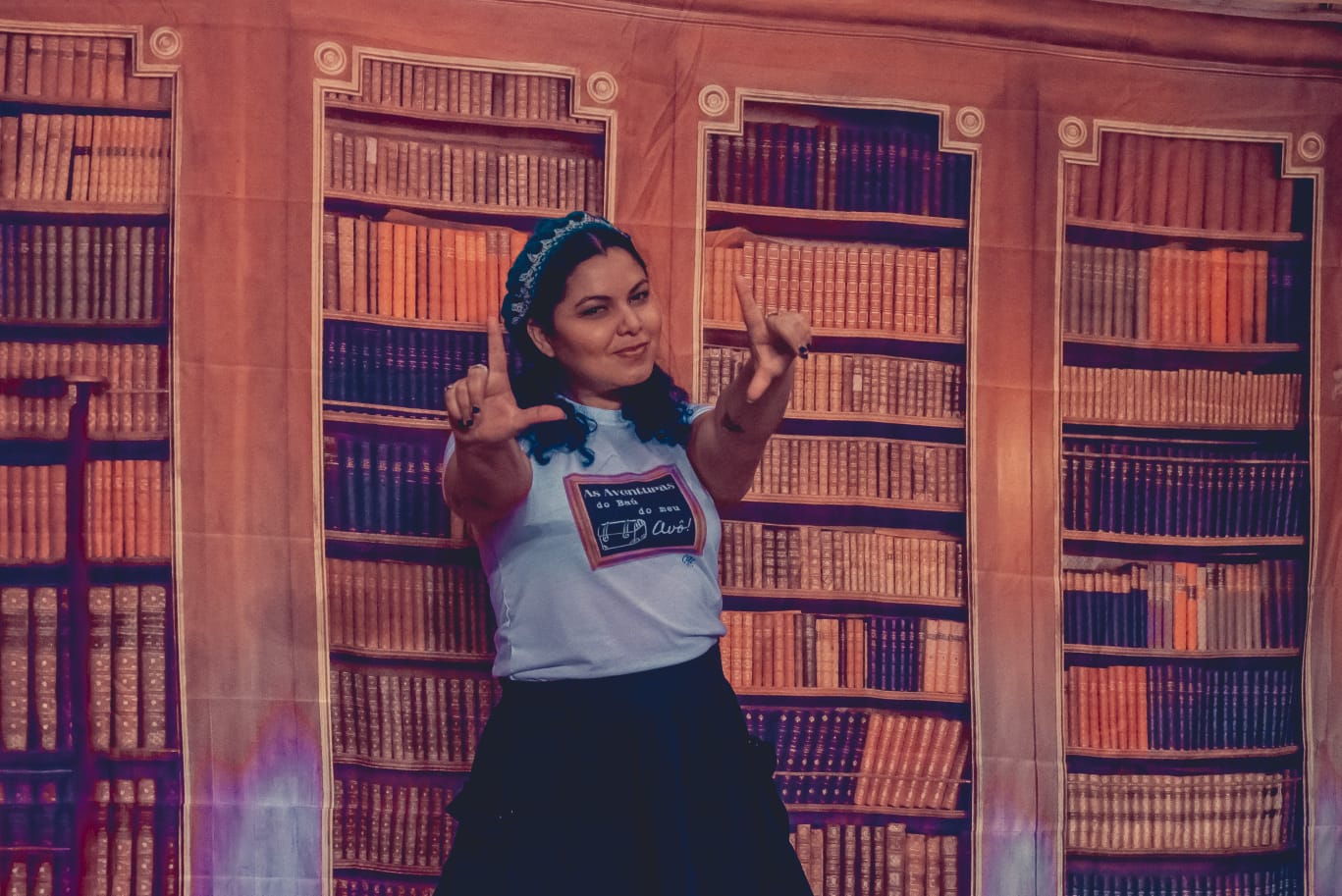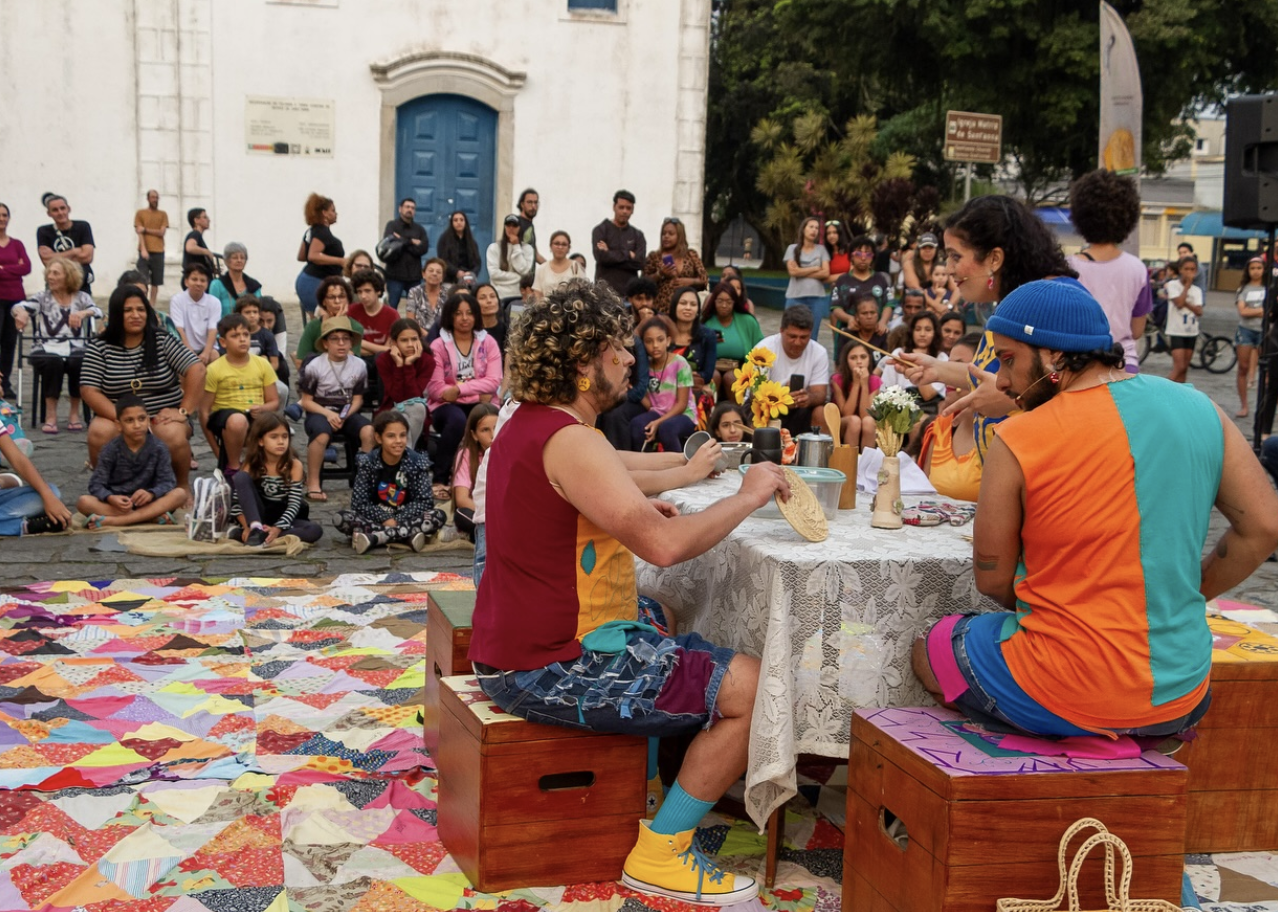In English
8 de setembro de 2021
Spotlight on Inclusion – Level 3
Article published in Joca 176

When she decided she wanted to take acting classes, Giselle Santiago, from Rio de Janeiro, noticed that most acting courses were expensive and were not accessible to everyone. Years later, when she was at the School of Performing Arts, she decided to teach classes for free to make theatre accessible to young people.
Today, after organizing nearly 20 plays, the actress is committed to bringing diversity to the stage in all her productions, ensuring, for example, that young people with special needs are included. That is how Giselle has become an inspiration for one of the actors, 10 year-old Arthur F., who interviewed her about the profession. Check it out below.
When did your passion for theatre begin?
It started when I was really young. The first memory I have is when I went to see a play by Ziraldo [who wrote books including O Menino Maluquinho] near my house. When I saw people on stage, I thought it was really cool and told my mother I wanted to do that.
What changes have you seen in the lives of children and young people who have had the opportunity to act in plays?
I think theatre changes people’s lives a lot, even if they don’t understand it when they’re doing it. Even those who don’t want to pursue acting as a profession, when they take a class, they work in groups and overcome their fears. That way, they already undergo many changes. I had students who were so shy, they didn’t even raise their heads when saying their names on the first day, but they ended up playing the main characters at the end of the year.
What prompted you to teach acting classes for free?
Not all my classes are free. I also have paying jobs because I live exclusively from art. If I did everything for free, I wouldn’t be able to pay my bills. But I do teach classes free of charge, because when I was a child and I wanted to act, it was very expensive and my mother was unable to enroll me in acting classes. On the other hand, I lived on a wealthy street in a simple village. So, any time there was a social project and we had to present proof of residence, I was never granted a scholarship, because my street was, theoretically, wealthier. I didn’t have money to pay for acting course, but I was not eligible for a scholarship either. When I started drama school, I came across a project called Teatro em Comunidades, which offered free classes, and I signed up to teach there. Being able to use what I know to provide something I couldn’t do as a child makes me very happy.
Do you think it is important for characters with special needs to be played by actors who have the same characteristics?
There was a time when people thought that people with special needs should be treated in an entirely special way and that they couldn’t do anything that others could. But actually, these people want to be included in everything that others do. I’m doing a play based on the book Onde está o Boris?? (Where is Boris?), by Janine Rodrigues, and one of the first things she asked me was that I cast an actress in a wheelchair to play the character that is in a wheelchair. I can’t say how important this is because I don’t have the same experience as she does, but this actress’ mother came to tell me that it was very important that other people look at her and feel that they are being represented.
One of the goals of your plays is to combat racism, by showing that black children can play all kinds of characters. How is this done?
I believe anyone can play any character. I will use Hansel and Gretel in which you are participating, Arthur, as an example. Who said Hansel and Gretel should be white or have straight hair? I think we could have an indigenous person playing the protagonist, or you, or anyone else. Anyone who watches the play realizes that he/she could also represent the main character, and that’s beautiful.
How do you provide free classes and plays for children?
I believe that when you do a play professionally in the theatre, actors should not have to pay to do it, they should get paid, because they’re on a job. It’s different from a class, where you pay to learn and then do a play. So, we use a portion of what is left from ticket sales to produce and, sometimes, we get public notices [processes in which people or companies apply for projects to obtain financial aid] which help fund the plays, in addition to partnerships or corporate sponsorships.
Questions
1) According to Giselle, what are some of the benefits of doing theatre?
a) Working in groups and reducing shyness
b) Making money through plays and working in groups
c) Theatre only benefits children who want to pursue a career in acting.
d) Reducing shyness and making money through plays
2) Have you ever watched a play? If yes, how was it? And if not, which play would you like to watch?
Ixi! Você bateu no paywall!
Ainda não é assinante? Assine agora e tenha acesso ilimitado ao conteúdo do Joca.












Você precisa fazer o login para publicar um comentário.